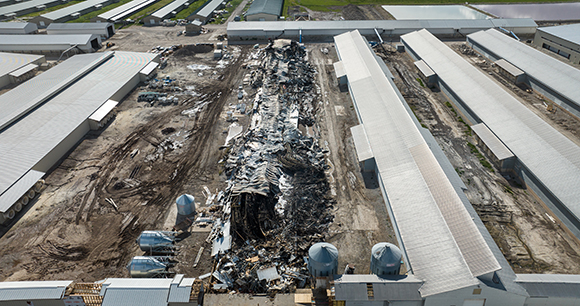
Washington, DC—The Animal Welfare Institute (AWI) is pleased that the National Fire Protection Association (NFPA) Standards Council has rejected an appeal filed by the National Pork Producers Council (NPPC) and other national animal agriculture groups that would have prevented a sprinkler requirement for certain industrial animal agriculture facilities from being included in the upcoming 2025 edition of NFPA 150, Fire and Life Safety in Animal Housing Facilities Code.
In January, the NFPA Technical Committee on Animal Housing—which oversees development and revisions of NFPA 150—took an important step toward strengthening protections for farmed animals by requiring sprinkler systems in medium- to large-sized commercial agriculture facilities in states or localities in which the code has been adopted.
As of 2025 in these jurisdictions, medium- to large-sized commercial facilities that are newly built or undergoing major construction would be required to install sprinkler systems, unless exempted by a local fire authority. Depending on the species and size of the animals at the farm, this would cover buildings housing anywhere from several hundred to tens of thousands of animals or more.
For nearly a year, the NPPC and its allies have fought vociferously to remove this lifesaving sprinkler requirement from the 2025 code. Following approval of the requirement in January, industry representatives filed a motion to have the language stricken, which failed in a vote of 161–210 at the NFPA’s annual Technical Meeting in June. In a last-ditch effort, the groups filed an appeal, which AWI opposed. The appeal was denied Friday.
“The sad irony is that the industry’s efforts to thwart progress on strengthening fire protections on farms have taken place during a year that will likely be one of the deadliest for animals in barn fires in at least a decade,” said Allie Granger, policy advisor for AWI’s Farmed Animal Program. “In fact, in the short time between the NFPA’s Technical Meeting and the rejection of this appeal, five fires have occurred on large commercial farms, killing tens of thousands of animals.”
In total, more than 8.2 million farmed animals have been killed in fires since 2013, when AWI began tracking these statistics.
“Despite repeated efforts by the NPPC and other groups to overturn the results of the code development process, raise doubt about the need for sprinklers in large facilities, and downplay the deadly problem of fires within their industries, the NFPA Standards Council has upheld this requirement in the 2025 code,” Granger said. “We look forward to continuing to work with the NFPA to further strengthen protections for the billions of farmed animals nationwide who are at risk of dying in barn fires.”
Marjorie Fishman, Animal Welfare Institute
[email protected], (202) 446-2128
The Animal Welfare Institute (awionline.org) is a nonprofit charitable organization founded in 1951 and dedicated to alleviating animal suffering caused by people. We seek to improve the welfare of animals everywhere: in agriculture, in commerce, in our homes and communities, in research, and in the wild. Follow us on Facebook, X (formerly Twitter), and Instagram for updates and other important animal protection news.